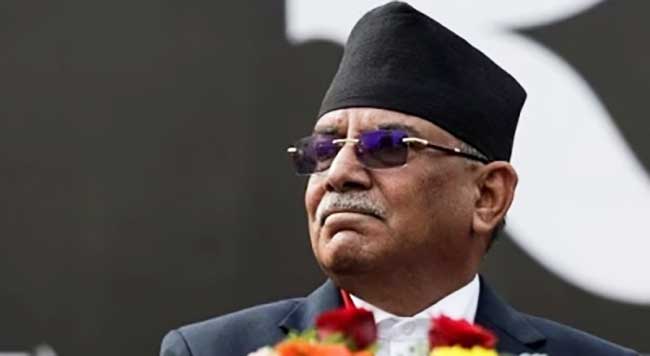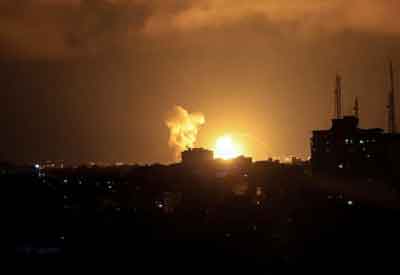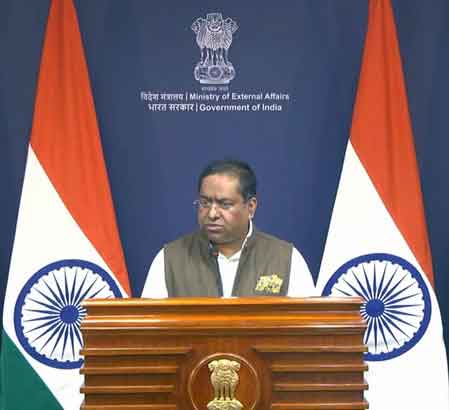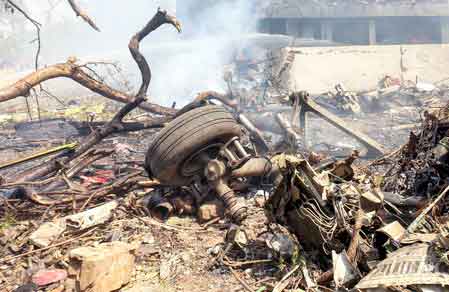A long-term energy deal between Nepal and India, to be signed during the upcoming visit of India's External Affairs Minister S. Jaishankar, will be a milestone, said Prime Minister Pushpa Kamal Dahal 'Prachanda'.
During Dahal's India visit in May-June, the two countries agreed to sign a long-term power agreement where India would import 10,000 megawatts from Nepal in ten years. However, the formal agreement could not be signed at that time.
Now, both the countries have formalized the long-term inter-government power trade agreement, which is expected to be signed during Jaishankar's visit to Nepal.
"Soon, we are going to sign the long-term energy deal with India," Dahal said on Friday while inaugurating the second largest electricity substation whose purpose is to export electricity to India.
The mid-term and long-term energy trading deal between Nepal and India will be signed in Kathmandu. For this, senior Indian officials are also arriving in Kathmandu, the Prime Minister added.
The 25-year long-term agreement was initiated when Dahal visited India between May 31 and June 3.
India's Prime Minister Narendra Modi had announced during a joint press meet with Dahal that the southern neighbour would buy 10,000 MW of electricity in 10 years from Nepal under the long-term power trade agreement.
"During my India visit, we have laid a good foundation for energy trade between Nepal and India. To materialize the long-term power trade which was agreed between Nepal and India and to use the abundant water resources of Nepal in a practical sense, we are going to make a special announcement in Kathmandu," said Dahal, whose government is battling due to poor governance, service delivery, recession in the economy, poor governance among others.
Dahal inaugurated the electricity substation which was largely built by Indian consultants and Indian construction companies and is largely instrumental in exporting energy from Nepal and India from the eastern part.
He also shared that Nepal has earned over Rs 15 billion (nearly 10 billion Indian rupees) while trading spill energy with India in the last year. After formalizing the agreement in writing, this will ensure India is the primary energy market of Nepal and in the first phase, Nepal will export 10,000 megawatts of energy to India. The agreement will be valid for another 25 years following the day of signing of the agreement.
Besides exporting power to India, there is a sharp increase in Indian investment in Nepal’s energy sector. India's SJVN Limited, which is developing the 900 MW Arun-3 Hydropower Project, has also been granted a license to develop the 669 MW Lower Arun Hydropower Project and the 490 MW Arun-4.
Arun-4 will be developed as a joint venture by the NEA and SJVN, which will have a majority stake.
Likewise, India's NHPC Limited is also set to develop the 750 MW West Seti and the 450 MW Seti River-6 project. Similarly, NHPC Limited and Vidyut Utpadan Company Limited signed a memorandum of understanding to jointly develop the 480 MW Phukot Karnali Project during Dahal’s India visit. Indian firm GMR is also making efforts to develop the 900 MW Upper Karnali Hydropower Project.






Haifa port in Israel operating normally despite Iran attack
There has been no damage to Israel’s Haifa port in the Iranian ballistic missile attack on an oil refinery nearby and cargo operations are progressing unhindered, according to media reports.
No recommendation, no discrimination: HM Amit Shah hails UP’s inclusive recruitment drive
In a historic ceremony, Home Minister Amit Shah and Uttar Pradesh Chief Minister Yogi Adityanath distributed appointment letters to 60,244 newly selected police personnel at the Defence Expo Ground in Sector 18, Vrindavan. Out of these 60,000 recruits, more than 12,000 comprised women.
Round-the-clock DNA profiling underway: FSL Gandhinagar Director explains complex process
The Forensic Science Laboratory (FSL) in Gandhinagar, Gujarat, has been operating around the clock to identify victims of the Ahmedabad plane crash through DNA profiling and matching.
Civil Aviation Ministry issues strict instructions to DGCA to enforce chopper safety
In the wake of a tragic helicopter crash in the Gaurikund area of Uttarakhand, the Ministry of Civil Aviation on Sunday issued strict instructions to the Directorate General of Civil Aviation (DGCA) to enforce all safety protocols related to chopper operations in hilly and sensitive areas like the Kedarnath valley.
‘Harming Indians will invite punishment’, HM Shah on Op Sindoor
Union Home Minister Amit Shah said on Sunday that through the anti-terror Operation Sindoor, Prime Minister Narendra Modi has sent a strong message across the world that the bloodshed of Indians will invite punishment.
Dassault CEO trashes Pakistan's claims on downing Rafale jets
Dassault Aviation Chairman and CEO Eric Trappier has dismissed as "factually incorrect" Pakistan’s claims about having shot down three Rafale fighter jets of the Indian Air Force during Operation Sindoor.
Tripura BJP stages protest over vandalism at Tagore's ancestral home in B'desh
Ruling BJP in Tripura on Saturday staged state-wide protests along the Bangladesh border, protesting the recent attack and vandalism of the ancestral home of Nobel laureate Rabindranath Tagore in the neighbouring country.
CM calls for mass awareness on voluntary blood donation
Chief Minister Prof. Dr. Manik Saha today urged to create massive awareness campaigns about the benefits of voluntary blood donation to encourage more people to donate blood.